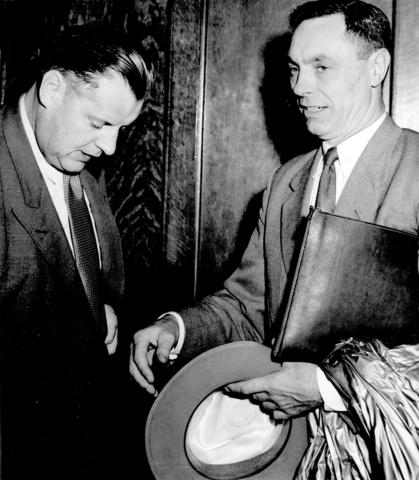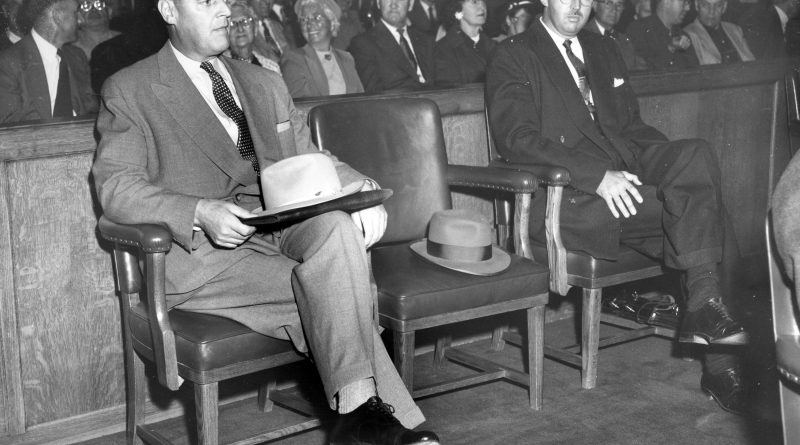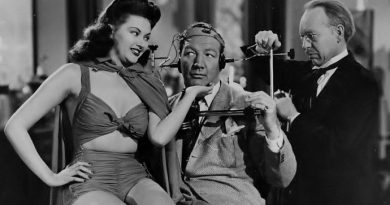Top Cop
Walter Mulligan, who got to be Vancouver’s chief of police on January 27, 1947, looked like a cop. He was six foot two, beefy at 230 pounds, tough, seasoned and confident.

[Image: Vancouver City Archives]
He sounded like a cop. Even his name was a perfect cop name: Mulligan.
Expectations were high for him: he’d been on the force for 20 years, starting April 21, 1927 with a long beat: Broadway, all the way from Granville to Main. (Another account has him starting out on Skid Road.) Ten years later he was promoted to detective, and 10 years after that he made chief—the city’s youngest ever at 42.
And not quite 10 years after that, he was forced out by scandal.
Mulligan set a record at the time for longevity as chief, and might have carried on for a lot more years. But he was caught with his hand in the till. There was lots of opportunity for graft at the time. Vancouver in the late 1940s was a happening place: there was after-hours gambling, bookies collected bets in beer parlors, private clubs and hotels, and bootleggers were thriving. It was a day when drinking wine and spirituous liquors was banned in restaurants and, believe it or not, in nightclubs. Revelers brought bottles into the clubs in brown paper bags, and paid high prices for ice and mixers from proprietors who looked the other way.
Mulligan would have been very aware of these activities: in August of 1946—five months before he became chief—he’d been named head of the police department’s newly-formed Criminal Investigation Bureau. That was a jump over the heads of many officers with longer service, and led to resentment by some. There was another reason for resentment in the minds of some of Mulligan’s rivals for advancement: he was, apparently, a favorite of the mayor of Vancouver at the time, the bumptious Gerry McGeer, who’d come into office about three weeks before Mulligan was named chief. Maybe Mulligan got the nod because McGeer was mayor.
McGeer had been mayor once before, in 1935-36, elected on an anti-crime platform. In his first week in office in ’35 he’d confiscated 1,000 slot machines. He would have been dismayed to see what became of his protégé, if Mulligan was his protégé, but he didn’t live long enough to see it happen: he died in office in August 1947, just seven months after being elected.
1947 is significant in the Mulligan story for another reason: that was the same year a hard-nosed Glaswegian reporter named Jack Webster joined the Vancouver Sun. Webster would loom large in this story. In fact, he says it made his name.
A snoopy reporter
But it was a snoopy reporter at the Province who started the Mulligan takedown. His name was Ray Munro, and he’d been frustrated for months at the refusal of his bosses to let him go after the chief, or after Detective Sergeant Leonard Cuthbert, who was sharing in the payoffs. Munro had a lot of inside informants, some of them cops who didn’t like Mulligan, or who thought he was incompetent . . . or crooked. “There is no way consistent pay-offs can be made by any squad leader to his men, unless the chief of police is in on the deal,” one of Munro’s informants told him. “Mulligan was taking a big envelope on a regular basis, giving back a smaller envelope to Cuthbert, who in turn was paying off his key men.”
How effective was Mulligan’s force at keeping Vancouver law abiding? From Judge Angelo Branca’s memoirs: “In 1951, after 565 convictions in six years against betting shops in Vancouver, the trade was flourishing as never before.”
In his days as a Sun reporter, Webster had seen police officers working as doormen at bookie joints.
Both the Sun and the Province were aware of stories about the chief’s acceptance of under-the-table payments, but for some reason were timid about investigating them. Finally, in frustration, in March of 1955 Munro quit and joined a new paper, a Toronto-based scandal sheet called Flash Weekly. Flash would not hesitate to make waves. Munro was named Vancouver editor.
He had with him four years of notes on Mulligan’s activities.
Flash hit the street June 15, 1955 with this headline: RAPE OF VANCOUVER! MUNRO TEARS MASK FROM CROOKED LAW IN GANGLAND EDEN. Expecting heavy sales, they had printed 10,000 extra copies. They were gone before the day was out.
Then the roof caved in.
Mulligan commenced action for libel against Munro and his paper, but that was overshadowed by the action of the Police Commission: they put Mulligan on temporary suspension and asked Attorney General Robert Bonner to set up a commission of inquiry to investigate Munro’s allegations.
At 8:15 the following morning Detective Sergeant Len Cuthbert, sitting at his desk in the police station, pressed his service revolver against the left side of his chest, aiming for his heart, and fired. He was rushed to hospital where emergency surgery kept him alive. The bullet, which went completely through him, had missed his heart by an eighth of an inch.
Later, it came out that Cuthbert—who was a fishing buddy of another Province reporter, Eddie Moyer—had casually told Moyer of the payoffs! The Province wouldn’t touch the story, so Moyer gave it to Munro!
The story widens
The Cuthbert suicide attempt opened the floodgates for Vancouver’s three dailies, the Sun, the Province and the News-Herald. They now began to print the details of stories they had been sitting on for months.
Cuthbert would live to testify against Mulligan, and it was chiefly his testimony that brought the chief down.
The commission of inquiry was led by R.H. Tupper, QC, a Vancouver lawyer and the former head of the faculty of law at UBC. He told the public that his job was “to ferret out information, not to establish guilt and lay blame.”
The courtroom was, of course, jammed, and some of the most prominent names in Vancouver journalism covered all or part of the proceedings: Jack Wasserman, Paddy Sherman, Jack Brooks, Dan Ekman, Simma Holt, Jean Howarth . . . and that hard-nosed Glaswegian, Jack Webster, who was now with radio station CJOR—he had left the Sun under less than amiable circumstances—and who was frustrated by Tupper’s ruling that no sound recording of the proceedings would be permitted.
Webster fell back on a skill he’d honed years earlier: rapid shorthand. “I was still a whiz at Pitman,” he says in his autobiography, “fast and accurate . . . Every day for two months I attended the hearings. The probe started in the old courtroom downtown and then it moved to City Hall where the council chambers doubled as a make-shift courtroom. I’d work on my notes during the breaks in a nearby alderman’s office and go on the air at one o’clock with a twenty-minute summation of the morning’s evidence by simply reading my notes. The nightly broadcast I did from CJOR’s studios on Howe Street. I began each evening with the same introduction: ‘This is the full story that was not in the Vancouver Sun today and won’t be in the Vancouver Sun tomorrow.’”
Among the many witnesses called were several seasoned police officers. Webster cracked, “I had never seen so many big, burly men, whose memories were as sharp as tacks during any criminal trial, testify one after the other, ‘I don’t remember, I can’t recall.’” Although one ex-cop, a fellow named Jack Whelan, did remember a time when he and Mulligan, then just another cop, were in someone’s home investigating a break-in and Mulligan shoved a glass piggy bank full of coins into his coat. He later split the proceeds with Whelan: $11 each.
That paled with tales of more recent, much bigger payoffs, mostly from bootleggers wanting the police off their backs. Len Cuthbert, still recovering from his self-inflicted gunshot wound, shocked the inquiry with his nervous recitation of payoffs made and split with Mulligan. Equally devastating was the testimony of Detective Sergeant Bob Leatherdale, an honest cop who not only refused to go along with the payoff scheme, but reported it to the city prosecutor, a judge and McGeer’s successor as mayor, Charles Thompson—all of whom, according to Ray Munro, sat on the report.
The newspapers had fun with a visit to Vancouver, during the inquiry, of Hollywood star Cary Grant, in town to publicize his movie To Catch a Thief.
Mystery lady
The inquiry also discovered—and this, to the delight of the city’s news editors, brought an element of sex into the story—that the very married Mulligan had a mistress. He’d been keeping her on the side for years, had given her jewelry and other gifts and money toward buying a house in Langley. She was heavily veiled at the inquiry, under heavy makeup, and her identity was never revealed. She was, however, the source of one of the better lines heard during the proceedings. When asked if she had ever wondered how it was that Mulligan could afford to lavish such gifts upon her, she replied, “I had the impression it didn’t come from his salary.”
In October 1955 Mulligan, who hadn’t testified, asked to be relieved of his duties. He had discreetly applied for landed immigrant status in the USA, and in December he left for the States where he soon got a job as a limousine-bus dispatcher at the Los Angeles airport.
The last day of the inquiry was January 27, 1956. Tupper found that, with the exception of Cuthbert and Mulligan, he couldn’t be sure of anyone else’s guilt. He chided Vancouver for its lax application of the Criminal Code of Canada.
What followed led Webster to label the commission a “whitewash.” The Attorney General’s office ruled that it didn’t have enough evidence to support Tupper’s finding of corruption and could not take the case to court.
That meant Mulligan would not be charged, and was in fact free to return to Canada at any time. He did just that in May of 1963, retiring to Oak Bay, accompanied by his wife Violet, who had stood by his side during the whole business.
Nobody ever went to jail.
Mulligan died in Oak Bay in May of 1987. His obit appeared in the Sun on Page 19. The story was, after all, more than 30 years old by then.


![The Empress, Victoria [Image: Wikipedia]](https://vancouverhistory.ca/wp-content/uploads/2021/01/Fairmont_Empress_Victoria_British_Columbia_Canada_08-390x205.jpg)
![Sun Yat-Sen Garden [Image: The Canadian Enclyclopedia]](https://vancouverhistory.ca/wp-content/uploads/2021/01/dd1cb474-9295-42a9-b726-f7d870214d33-390x205.jpg)
